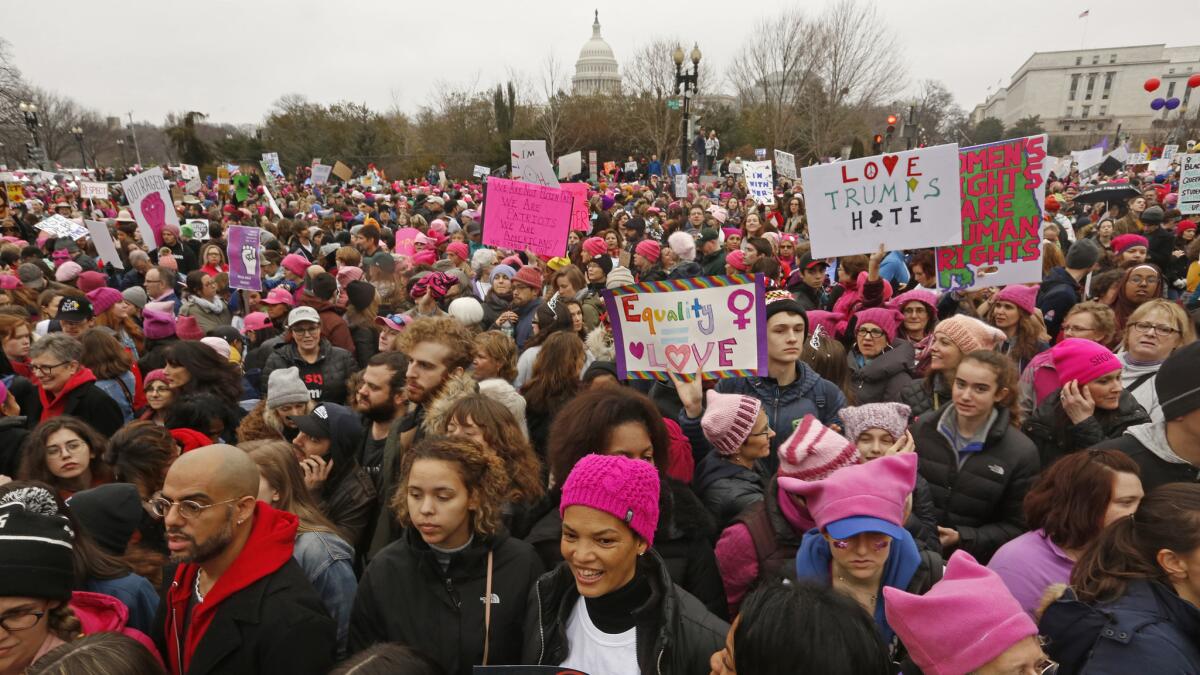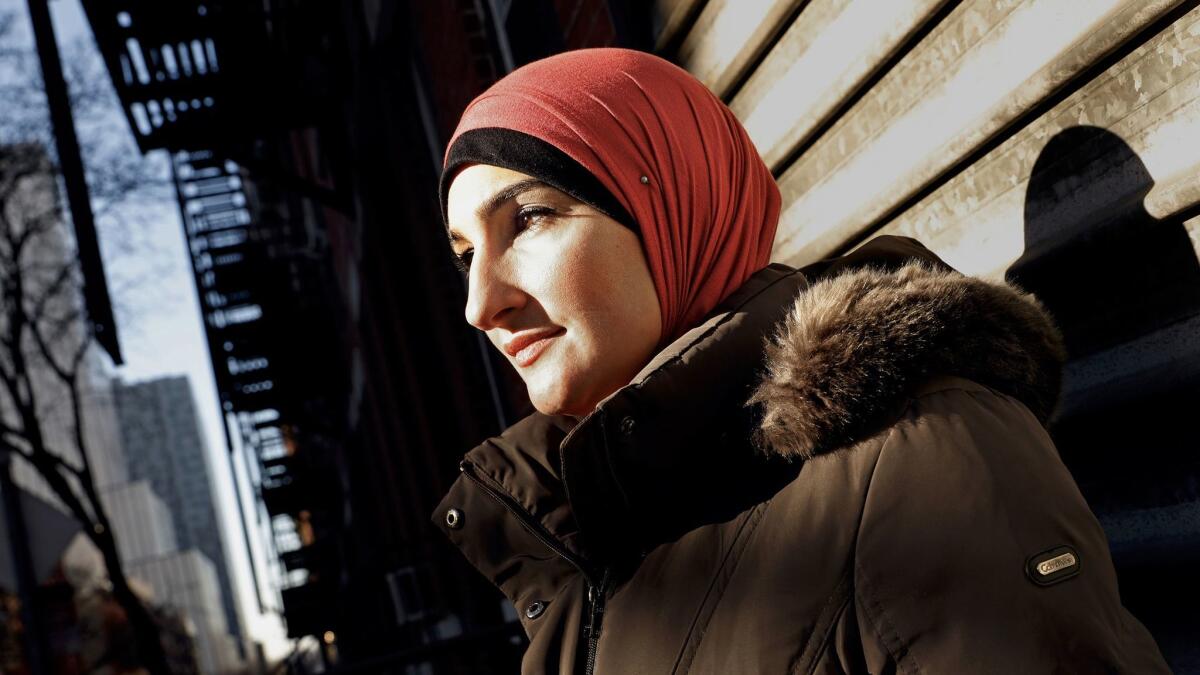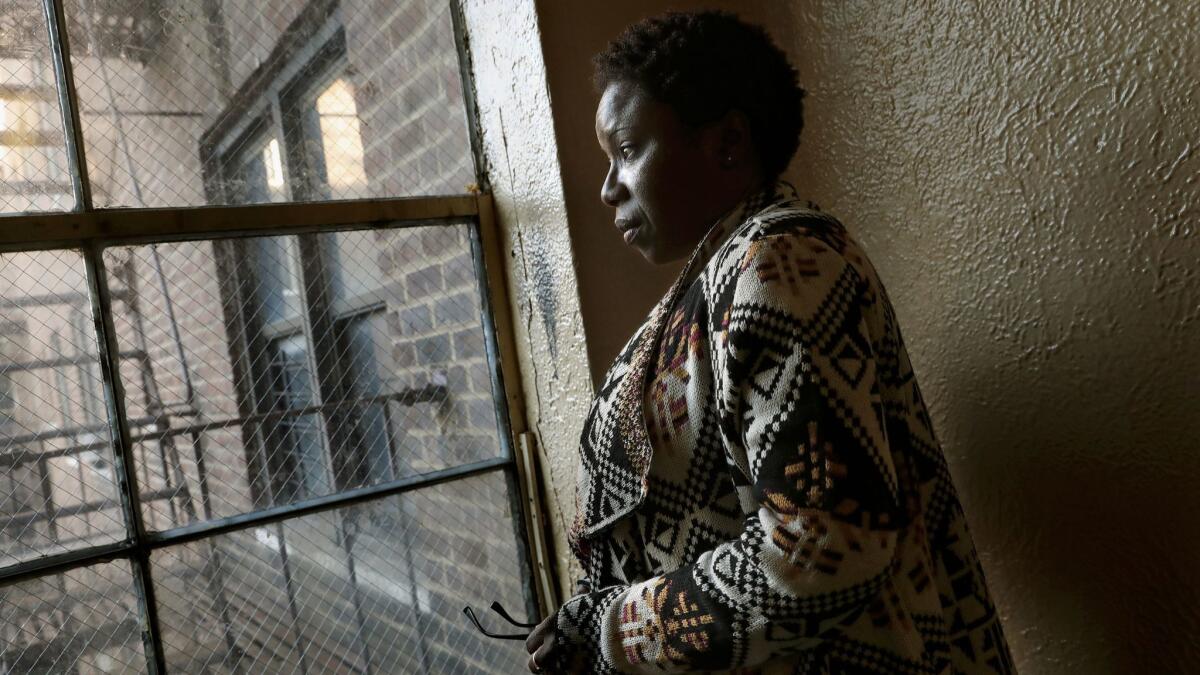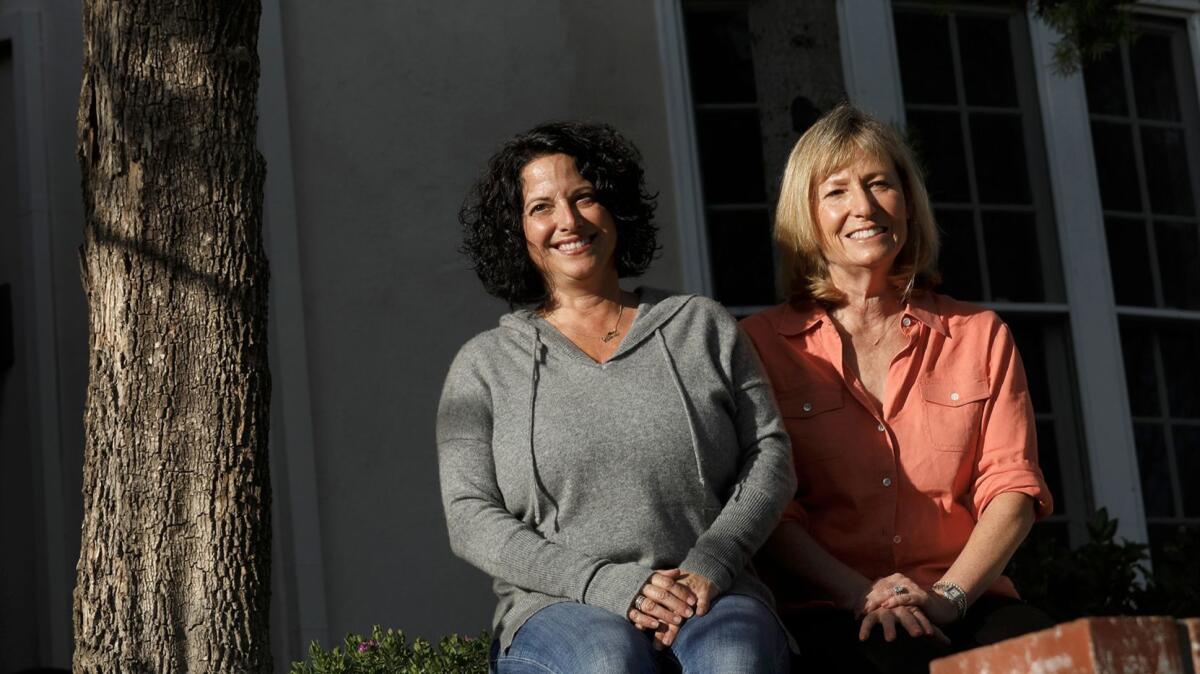After a year of Trump and outrage, this weekend’s women’s march will focus on electoral politics

- Share via
A year after a sea of knitted pink “pussyhats” greeted Donald Trump’s inauguration as the 45th U.S. president, women and their allies will again take to the streets this weekend in dozens of cities across the country, voicing anger, channeling hopes and weighing how the country has fared in the year after one of the most divisive presidential elections in recent memory.
Organizers and many participants say the tone has shifted from Jan. 21, when the millions of women who turned out to march — in Washington, nearly every major American city and as far away as Australia and Europe — shocked even those who had organized the protests.
Sheer size yielded a cultural moment, one that became part of a wider social reckoning that would coalesce months later into the #MeToo and #TimesUp movements demanding accountability for sexual misconduct.
In many quarters, last year’s largely spontaneous outpouring of outrage over a president who had bragged of sexually assaulting women is giving way to a determined focus on electoral politics — together with targeted activism on issues such as immigration, healthcare and deepening racial divides, all of which became contentious points of debate during Trump’s first year in office.
Some marchers have described newfound political activism, even if only in small steps. Judy Lamb, a retired public-school teacher in Mission Viejo, said that for the first time, she’s regularly contributing money to the Democratic National Committee and calling her congresswoman, Rep. Mimi Walters (R-Irvine), to urge her to vote against Trump’s policies.
Lamb, 71, plans to wear the same anti-Trump T-shirt in Saturday’s march in Santa Ana that she put on a year ago when she protested with hundreds of thousands of others in downtown Los Angeles. (Most of the marches around the country are set for Saturday, the day before the actual one-year anniversary, with some events planned Sunday as well.)
“I’m just very disappointed,” Lamb said of the president’s first year in office, citing racially charged remarks by Trump and the uncertain fate of the Deferred Action for Childhood Arrivals program, which offers protection for people brought to the United States as children.
Organizers are hoping to see newfound activism play out on a far larger scale, with November’s midterm elections as a lodestar.
“We had to work over the course of the year to build a movement that was going to be translated into political power at the polls in 2018,” said Linda Sarsour, one of the main New York-based organizers behind last year’s marches.

This year, Women’s March Inc. is spearheading a broad campaign focused on voter registration, increasing voter engagement and turnout, electing progressive candidates to office, especially women, and targeting swing districts. The drive kicks off Sunday in Las Vegas, a venue chosen because Nevada is a battleground state that went for Hillary Clinton in 2016.
Somewhat ironically, Trump’s unlikely success emboldened some female candidates who might not otherwise have jumped into races, said Erin Vilardi, the founder and executive director of VoteRunLead, which trains women to run for political office and will hold a post-march event Saturday in New York.
“Seeing someone so unqualified become president of the United States, a lot of women said, ‘Hell, I can do city council,’ ” Vilardi said.
The push by those who feel targeted or marginalized by Trump to seek elected office is already yielding something of a sea change in deep-red states like Georgia and Alabama. In Doraville, Ga., a diverse city in the northeast suburbs of Atlanta, Stephe Koontz was elected last year as a city councilwoman, becoming the state’s first openly transgender female.
Koontz, 58, a retired car mechanic and business owner, said she was inspired, in part, by the women’s march last year. Until then, she said, every time she talked about running, friends would tell her: “You can’t run. You’re transgender — you’re unelectable.”
“I came away believing in myself that I could do this,” Koontz said. “It was a shift from pessimism to optimism, just seeing all these people who believed the same as I did: that what we were seeing is not the new normal, and we are ready for change.”
For some, this weekend’s protests are a moment to consider the ever-tightening entwinement of the personal and the political. Among them are women like Samantha Imhoff, a 45-year-old Guyanese immigrant who works as a medical assistant in New York City.
Trump’s presidency and the activism it inspired, Imhoff said, have changed how she navigates her home and work life — even if the demands of her job, her weekly nursing classes, and caring for her husband and two children didn’t grant her the luxury of time to march last year.

“I realized I can speak up,” said Imhoff, traces of her native country still present in her softly accented English. As an example, she described challenging her husband, who is also Guyanese, after finding out that he had begun looking on his own for a family house.
“I was upset — and I said so. I said, ‘You cannot keep making decisions on your own,’ ” she recalled. Contrite, he began talking with her about the search, showing her pictures of prospective homes. They’re moving in this weekend to one they picked out together.
At work, too, Imhoff said she has demanded fair treatment for some of her colleagues who struggle with English.
“Even in your own small speaking up — I see it as a rebellion,” she said.
Recalling the energy and enthusiasm of last year’s marches is bittersweet for some. Dina Rimmon and Robin Shephard, both of Cheviot Hills, attended the Los Angeles march together, hoping for the best but fearing the worst. Now the two friends are working together on a get-out-the-vote campaign.

This year’s Los Angeles march, not surprisingly, is celebrity-heavy: The lineup of those scheduled to take the stage includes Scarlett Johansson, Megan Mullally, Olivia Munn, Olivia Wilde and Alfre Woodard, the organizers said.
The march is scheduled to start at 8:30 a.m. in Pershing Square and end in Grand Park. Venues for other Southern California marches include the South Bay, Orange County, Riverside County, Kern County, Bakersfield and Santa Barbara.
Shephard, 60, who was interviewed by The Times amid last year’s chaotic downtown crush, recalled her pessimism at the time about Trump’s tenure — “I was right, wasn’t I?” she said this week. But she’ll be back to march again.
“It made people recognize there were like-minded people out there — millions of them,” she said. “It gave us hope that we can all do our small little part, and create a change.”
Staff writers Agrawal reported from New York, King from Washington and Smith from Los Angeles. Special correspondent Jarvie reported from Atlanta. Staff writers Cindy Chang and Ann Simmons contributed from Los Angeles.
More to Read
Sign up for Essential California
The most important California stories and recommendations in your inbox every morning.
You may occasionally receive promotional content from the Los Angeles Times.












